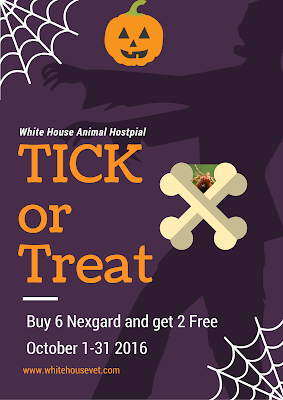Pack your bags.
Pack your car.
Pack your sleigh.
But don’t let your pet pack on the holiday pounds.
Holiday season is upon us — a busy time of year for
festivities, family and of course, lots of eating! Did you know that if a
ten-pound cat ate just one ounce of cheddar cheese from your hors d’oeuvres, it
would be the same as if a person ate three and a half hamburgers or four
chocolate bars? Gaining those “holiday pounds” is not just a problem for
humans, but also for our four-legged friends.
Research shows that pets are more likely to gain unwanted
pounds during this holiday period than any other time of year. What pet can
resist a potato chip, onion dip or chocolate? (Wait, you know better than to
feed them that!)
Obesity is the leading medical problem in pets. When a pet
is too chubby, not only may they have little energy to walk or play, but also
studies have shown that pets who are overweight may have a shortened life span.
How can you tell if your pet is at the right weight?
It can be hard to know because for many pets, they don’t get
a big round belly. Instead, the extra fat is well hidden inside your pet’s
body, tucked between their vital organs. So let us check! Our veterinary
practice team has a trained eye to best assess your pet’s weight. Bring your
pet in for their yearly exam and we’ll take a look at their body condition and
nutritional needs. If we determine your pet needs to lose a few pounds, don’t
worry. We’ll come up with a plan that will keep you and your pet sailing
through the holiday season.
Call White House Animal Hospital today to schedule your pet’s yearly checkup. Happy
holidays and remember, pack your suitcase. Pack a trunk. It’s even fine to pack
a sleigh. But don’t let your pet pack on the pounds!
Merry Christmas and Happy New Year!
Kristi May, MS, CVPM, LVMT, AHT, BS, ABCDT
White House Animal Hospital 615-672-0357
Like us on Facebook at https://www.facebook.com/pethospital/
Follow us on Twitter at https://twitter.com/WHPetVet


















